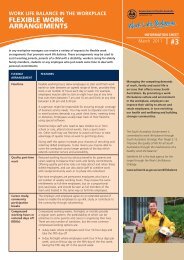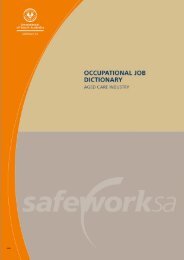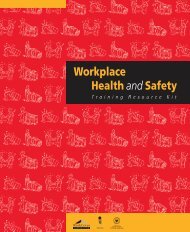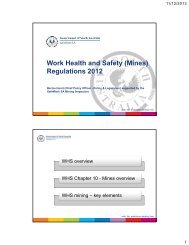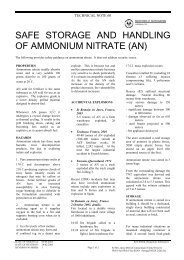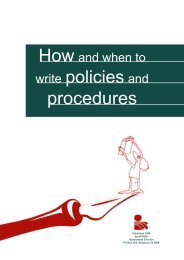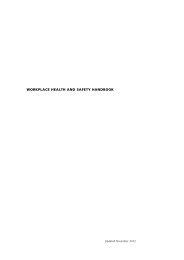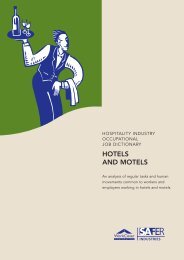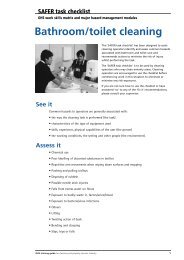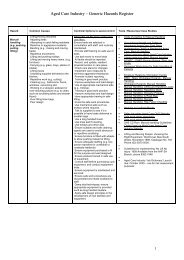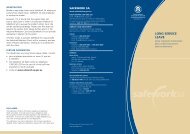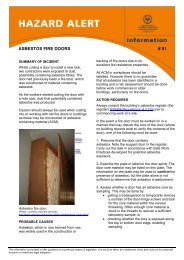Alcohol Drugs Workplace Alcohol Drugs Workplace - SafeWork SA ...
Alcohol Drugs Workplace Alcohol Drugs Workplace - SafeWork SA ...
Alcohol Drugs Workplace Alcohol Drugs Workplace - SafeWork SA ...
You also want an ePaper? Increase the reach of your titles
YUMPU automatically turns print PDFs into web optimized ePapers that Google loves.
4<br />
2.5 Duty in relation to third persons<br />
Responding to a hazard presented by alcohol and other drugs may also include a situation<br />
where a third person, who is not an employee, enters the workplace affected by alcohol<br />
and other drugs. An example includes when a client, customer or visitor is at the<br />
workplace.<br />
Should this situation occur, the employer and employee must respond by minimising the<br />
risk that an impaired third person may present in the workplace. If such an occurrence is<br />
likely, it is advisable to have workplace procedures in place that outline how to deal with<br />
this situation. If the nature of the workplace presents special risks to employees, for<br />
example if employees regularly work alone, it may be advisable to have in place extra<br />
safety precautions such as distress alarms.<br />
2.6 Duties of employers under the Occupational Health, Safety and<br />
Welfare Regulations 1995<br />
Under the Occupational Health, Safety and Welfare Regulations 1995, employers have a<br />
duty to identify hazards that have the potential to cause injury, assess how likely these<br />
hazards are to cause injury and control the risks to minimise injury and illness. This should<br />
be done in consultation with employees and their representatives. This process is outlined<br />
in Section 3.<br />
Reg 1.2.2 (1) (c) repeats Section 21 of the Act, namely that an employee should ensure<br />
that he or she is not, by the consumption of alcohol or a drug, in such a state as to<br />
endanger the employee’s own safety at work or the safety of any other person at work.<br />
2.7 Other legislation<br />
Persons at workplaces should be aware of other South Australian legislation relevant to<br />
alcohol and other drugs such as:<br />
• Controlled Substances Act 1984<br />
This Act relates to the regulation and prohibition of the manufacture, production, sale,<br />
supply, possession, handling or use of certain poisons, drugs, therapeutic and other<br />
substances, and of certain therapeutic devices.<br />
• Road Traffic Act 1961<br />
Offences relating to driving a motor vehicle, truck or mobile equipment whilst under the<br />
influence of alcohol and/or drugs.<br />
• Workers' Rehabilitation and Compensation Act 1986<br />
This Act provides for rehabilitation and compensation of workers in respect to disabilities<br />
arising from their employment. There are specific implications for workers under this Act<br />
in relation to being under the influence of alcohol or other drugs.<br />
• Harbors and Navigation Act 1993<br />
Sections of this Act relate to operation of a vessel while under the influence of alcohol<br />
or other drugs.<br />
• Security and Investigation Agents Act 1995<br />
This Act relates to persons working in the security and investigations industry and has<br />
specific requirements relating to the consumption of alcohol or other drugs.<br />
• Rail Safety Act 1996<br />
This Act relates to persons working in the rail industry and has specific requirements<br />
relating to the consumption of alcohol or other drugs.<br />
• Fire and Emergency Services Act 2005<br />
This Act relates to persons working as firefighters or emergency services officers and has<br />
specific requirements relating to the consumption of alcohol or other drugs.<br />
Guidelines for Addressing ALCOHOL & OTHER DRUGS IN THE WORKPLACE



